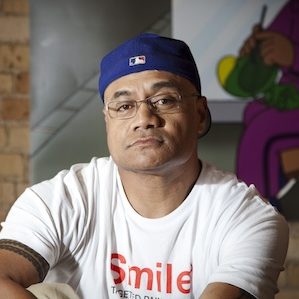
Oscar Kightley is a critically acclaimed writer, actor, director and television presenter renowned for his comedy work, particularly with BRO’TOWN and The Naked Samoans.
Oscar started writing for the stage in 1996 with A Frigate Bird Sings (co-written with David Fane), which gained success at the 1996 New Zealand International Arts Festival. Oscar’s first solo venture as a playwright, Dawn Raids, premiered in Auckland a year later and in 1998 he was awarded the Bruce Mason Playwriting Award. In 2004, Oscar wrote Niu Sila with Dave Armstrong, which played to sell-out crowds. In 2006, Oscar was made a Laureate by the Arts Foundation of New Zealand.
Oscar wore two hats as the lead actor and co-writer of 2006 hit film SIONE’S WEDDING which reached the number one position in the New Zealand box office in its first week of release, and had the biggest opening weekend of any New Zealand-made film. SIONE’S WEDDING grossed over $4 million at the New Zealand box office and it is still in the all-time’s top five most popular New Zealand films.
Oscar is a member of the Naked Samoans comedy group, who have performed all over New Zealand since 1998. Oscar co-hosted TV3’s coverage of Super 12 Rugby and the weekly sports show, SPORTZAH, as well as being a writer/performer for SKITZ and TELLY LAUGHS for TV3. He’s also a presenter on Nui FM’s breakfast show. Oscar is also one of the creators and writers of the animated TV3 comedy phenomenon BRO’TOWN, which has won several Best Comedy prices at the NZ Screen Awards.
In 2007 Oscar was appointed as a member of Creative New Zealand’s Arts Council by then Prime Minister and Minister for the Arts – Helen Clark and in 2009, he featured in the Listener’s list of New Zealand’s 50 most powerful people. More recently, Oscar has featured in the TV3 series RADIRADIRAH, reprised his role of Albert in the sequel of SIONE’S WEDDING, which he wrote with James Griffin, as well as being the director on Series 2 of SUPERCITY.
His most recent role was as lead police detective Harry Anglesea in TV3’s HARRY.
Case Study: We Need to Talk About Harry


